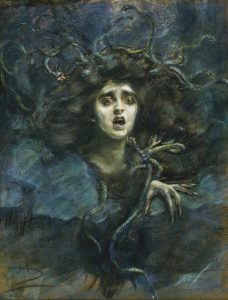Introduction to the Course & Text
“What does our great historical hunger satisfy, our clutching about us if countless other cultures, our consuming desire for knowledge, if not the loss of myth, of a mythic home, the mythic womb?”
–Friedrich Nietzsche
Ernst Cassirer writes in Language and Myth that myth is a “miracle of the spirit.”

One of its distinctive features is that it doesn’t necessarily refer back to an objective reality. It may refer to an internal, abstract, conceptual or emotional (invisible) reality. In as far as it tries to describe that which can’t be known or named in an ordinary way-the mystical experience of God, or Gods-it is a language of symbols, of metaphors, a language of correspondence rather than reference.
This text uses insights gleaned from the fields of anthropology, religious studies, depth psychology, literature, and archaeology to explore the fundamental wisdom of the world’s great mythological traditions. Special attention is paid to connecting the symbolic narratives and ceremonies of the ancients to the experiences, thoughts, and beliefs of people living today across a wide spectrum of identities and cultural perspectives. The material is updated regularly to be as relevant, engaging, and scholarly as possible.
Through readings, videos, journal and essay writing, discussion groups, and special projects, the students will not only come to learn more about the deepest truths expressed within these traditions, but be encouraged to respond in ways that express how these fundamental truths align with their own experiences, beliefs, observations, and values.
The text aligns with the Blackboard course ENG 250: World Mythology by Andy Gurevich at Mt Hood Community College.

